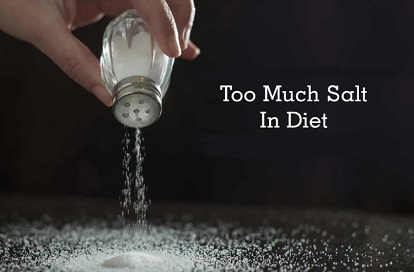BREAKING Diabetes News! A Study For The First Time Finds That Too Much Salt Consumption Can Also Increase Risk Of Diabetes!
Nikhil Prasad Fact checked by:Thailand Medical News Team Nov 04, 2023 1 year, 5 months, 2 weeks, 2 hours, 13 minutes ago
Diabetes News: A recent study conducted by Tulane University has unveiled a groundbreaking connection between frequent salt consumption and Type 2 diabetes. While individuals at risk for Type 2 diabetes are often cautioned to limit their sugar intake, this research suggests that salt may be another factor they should consider. In this
Diabetes News report, we will delve into the study's findings, explore the potential health risks of high salt consumption, and discuss the implications of these findings.
 Tulane University's Groundbreaking Research
Tulane University's Groundbreaking Research
In a pioneering effort, Tulane University embarked on a comprehensive study to examine the relationship between salt consumption and Type 2 diabetes risk. This study marks the first of its kind to establish a connection between frequent salt addition to foods and the development of Type 2 diabetes. The research aimed to fill a crucial knowledge gap regarding the long-term dietary sodium intake's impact on diabetes risk.
Over 400,000 individuals from the UK Biobank were surveyed, providing valuable insights into the potential risks associated with salt consumption. These participants were initially free of diabetes, chronic kidney disease, cancer, and cardiovascular disease at the study's outset. Over a median follow-up period of 11.9 years, more than 13,000 cases of Type 2 diabetes emerged within the cohort.
The study's results were both startling and significant. Individuals who frequently added salt to their foods had a progressively higher risk of developing Type 2 diabetes.
Compared to those who "never" or "rarely" added salt, participants who "sometimes," "usually," or "always" added salt exhibited a 13%, 20%, and 39% higher risk, respectively. This trend pointed to a compelling association between salt consumption and the risk of Type 2 diabetes.
The Health Implications
These findings are particularly remarkable because they provide new insights into the prevention of Type 2 diabetes. While prior research has already emphasized the importance of limiting salt intake to reduce the risk of cardiovascular diseases and hypertension, this study takes it a step further by revealing that salt reduction could also be a significant preventive measure against Type 2 diabetes.
Dr Lu Qi, the lead author of the study and HCA Regents Distinguished Chair and professor at the Tulane University School of Public Health and Tropical Medicine, highlighted the importance of this research. "We already know that limiting salt can reduce the risk of cardiovascular diseases and hypertension, but this study shows for the first time that taking the saltshaker off the table can help prevent Type 2 diabetes as well," said Dr Qi. This groundbreaking revelation offers a promising avenue for individuals to proactively manage their diabetes risk.
The Connection Between Salt and Diabetes
While the study established a clear connection between salt consumption and Type 2 diabetes
, the underlying mechanisms of this association are not yet fully understood. Dr Qi and his team suspect that salt may influence dietary habits, leading to the consumption of larger portions, which, in turn, increases the likelihood of developing risk factors such as obesity and inflammation.
In fact, the study revealed a strong correlation between frequent salt consumption and higher body mass index (BMI) and waist-to-hip ratio.
These findings suggest that excessive salt intake may encourage overeating and contribute to an individual's propensity to develop diabetes-related health issues.
Dr Qi emphasized the need for further research in this area, including clinical trials to explore the precise effects of salt reduction on diabetes risk.
Taking Action to Reduce Salt Intake
While the study results shed light on the potential dangers of excessive salt consumption, they also offer a message of hope and empowerment. It's never too early to take proactive steps to protect your health. Reducing salt intake is a relatively simple and effective change that can have a significant impact on overall well-being.
Dr Qi encourages individuals to start searching for low-sodium ways to season their favorite foods. This small but impactful dietary shift can lead to significant improvements in health, reducing the risk of not only cardiovascular diseases and hypertension but also Type 2 diabetes. The power to take control of one's health through mindful dietary choices is within reach.
The Significance of the Study
The groundbreaking research conducted by Tulane University opens new avenues for understanding and preventing Type 2 diabetes. This study serves as a critical reminder that our dietary choices have far-reaching consequences on our health. The link between salt consumption and diabetes risk reinforces the importance of maintaining a balanced and mindful approach to our diets.
Additionally, the study's findings have broader implications for public health policies. Health organizations and policymakers should consider incorporating salt reduction strategies into their diabetes prevention initiatives. This research provides a compelling argument for focusing on salt intake as a preventive measure that can potentially reduce the burden of Type 2 diabetes on healthcare systems and individuals alike.
In summary, the Tulane University study linking frequent salt addition to foods with a higher risk of Type 2 diabetes is a groundbreaking contribution to the field of diabetes research. With over 400,000 participants surveyed, the study reveals a significant association between salt consumption and diabetes risk. This research underscores the importance of reducing salt intake as a vital preventive measure and offers hope for individuals looking to manage their diabetes risk through dietary choices. As science continues to shed light on the complexities of diabetes, it is imperative that we take proactive steps to protect our health and well-being, and reducing salt intake is a simple yet powerful way to do so.
The study findings were published in the peer reviewed journal: Mayo Clinic Proceedings.
https://www.mayoclinicproceedings.org/article/S0025-6196(23)00118-0/fulltext
For the latest
Diabetes News, keep on logging to Thailand Medical News.
